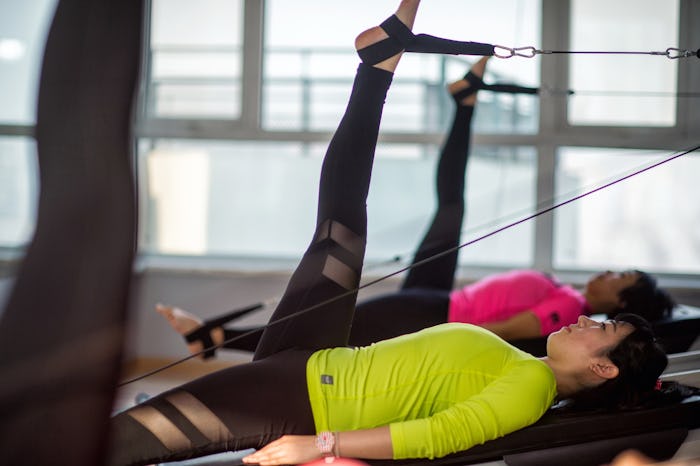Life

What To Know About Doing Pilates When Pregnant
If you're a fairly active person, discovering that you're pregnant may lead you to wonder what you can do to stay active throughout the next nine plus months. Can you still do the same long weekend runs to which you're accustomed? Is yoga in or out? Is Pilates safe when you're pregnant? It's important to be clear on this information — and, above all else, consult with a doctor — before getting active with a baby bump.
According to WebMD, most exercises are safe to do when pregnant, including many that you may already incorporate into your routine. That being said, full-body workouts that incorporate stretching and body weight resistance, focus on technique, and use specialty contraptions, might make you a bit skeptical Pilates, which can be done either on an apparatus in a studio or on a mat, is one such workout. Lots of men and women love Pilates for its precise, core-strengthening movements. And although opinions may vary instructor to instructor, it's possible to safely incorporate a Pilates routine into your larger workout schedule, even through your pregnancy.
"I think that it’s never too late to start, so even if you have no experience with Pilates, if you wanted to start and you’re nine months pregnant, I would be more than happy to work with you and we will just tailor the exercises and make it make sense for your body," regional Pilates director for Chicago-based Fitness Formula Clubs and a former birth doula Kristin Strom tells Romper. "There are certain exercises that are safe for pregnancy, there are certain exercises that are unsafe, and then there are certain exercises that are really beneficial for pregnancy and that’s when it comes [down] to having a specialist, somebody that really understands pregnancy and a woman’s body during that time, to be able to know the difference between just safe exercises and exceptionally beneficial movement patterns."
First thing's first, if you're going to do Pilates while pregnant, you should find a certified and experienced teacher who has worked with pregnant women before. As Strom says, "that’s going to keep you the safest and make sure that you have the most benefit from it." Choosing a style of session might also be helpful. Mat classes may or may not be the way to go, as many of them focus heavily on abdominal exercises. As noted by Parents, however, many mat moves are fairly easily modified, so if mat Pilates is your love, you don't have to give it up entirely during pregnancy.
Other considerations that are specific to pregnancy include the physical changes your body is undergoing. Strom notes that changing hormone levels can, for some women, make joints more flexible. Pilates instructors will need to keep an eye on your wrists and knees to make sure they're not hyperextending, your hips to make sure they're not twisting, and the rest of your skeletal system to watch for over-range of motion, which can result in wear and tear on your ligaments and tendons if not kept in check.
Additionally, the rise in your blood volume during pregnancy can cause you to become winded sooner or make you more likely to get a little bit lightheaded during workouts. This is of extra concern in Pilates, where there can be a lot of transitioning between laying horizontally, sitting, and standing. Staying hydrated, while always important, is especially important for active pregnant women.
Strom also emphasizes the need for a proper warmup, in order to prevent lightheadedness and injury. "I always recommend my pregnant women start warming up slower than you would normally go through if you were not pregnant, warm up more gradually, stay at a steady state for a longer period of time to let the body adjust to it, make sure the blood’s pumping," she says. "Instead of a five minute warmup, you’ll probably do a 10 minute warmup and then, again, make sure you’re hydrated before you transition exercises."
You don't have to give up your Pilates workout just because you're pregnant (unless, of course, you're advised to by your doctor). Slowing things down, moving with intention, staying mindful, and working with an experienced instructor can all make incorporating a Pilates practice into your pregnancy safer.
This article was originally published on